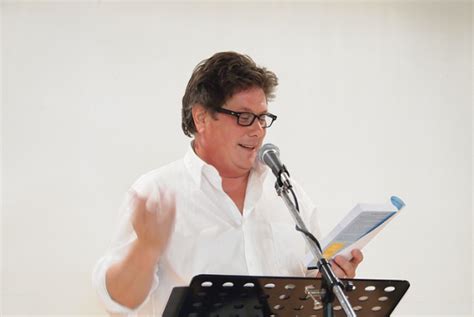Top 1109 Afternoon Naps Quotes & Sayings - Page 19
Explore popular Afternoon Naps quotes.
Last updated on November 15, 2024.
Aragorn: Gentlemen! We do not stop 'til nightfall. Pippin: But what about breakfast? Aragorn: You've already had it. Pippin: We've had one, yes. But what about second breakfast? [Aragorn stares at him, then walks off.] Merry: Don't think he knows about second breakfast, Pip. Pippin: What about elevensies? Luncheon? Afternoon tea? Dinner? Supper? He knows about them, doesn't he? Merry: I wouldn't count on it Pip.
I'm one of the people who believes that our losses were greater than our gains. Because before the Civil Rights movement we had entrepreneurship in the black community. Right now, in Harlem, if I wanted to get a shoe repaired, I would have a hard time finding a black shoe repairman. On near about every third corner, you could find a decent black barber, decent black laundry, had restaurants in the neighborhood that were open 24 hours. The food was good at 3 o'clock in the morning as at 3 o'clock in the afternoon.
Have you got any soul?" a woman asks the next afternoon. That depends, I feel like saying; some days yes, some days no. A few days ago I was right out; now I've got loads, too much, more than I can handle. I wish I could spread it a bit more evenly, I want to tell her, get a better balance, but I can't seem to get it sorted. I can see she wouldn't be interested in my internal stock control problems though, so I simply point to where I keep the soul I have, right by the exit, just next to the blues.
I remember one afternoon when we were out on a golf course somewhere, and Lauren Bacall, James Garner, and Jack Lemmon were sitting there in deck chairs when I went off to do another scene. And I said something like, "Hey, where have you guys been?" And they said, "Oh, we were down at the clubhouse. We saw your scene!" And Jack Lemmon looked at James Garner, and James Garner looked back at me, and then they both looked back at me and said in unison, "You bet your ass it is!" So I've been up there with the greats. I've had my fleeting moments with theatrical genius.
I've been moving a little to the music while I worked ...and then I realize I am actually dancing. It feels wonderful, though I can feel how stiff my muscles are, how rigidly I've been holding myself...Mostly I've been moving cautiously, numbly, steeled because I know, at any moment, I may be ambushed by overwhelming grief. You never know when it's coming, the word or gesture or bit of memory that dissolved you entirely...It happens every day at first, then not for a day or two, then there's a week when grief washes in every morning, every afternoon.
...a river season will last as long as it takes you to reach your new place. If you get into the river and let it take you where you need to be, your river season will last an afternoon. But if you fear change and struggle and hold on to the rocks, the river season will last and last. It will not end until your body becomes exhausted, your grip weakens, your hands slide off the rocks and the current takes you to your new place.
One swing set, well worn but structurally sound, seeks new home. Make memories with your kid or kids so that someday he or she or they will look into the backyard and feel the ache of sentimentality as desperately as I did this afternoon. It's all fragile and fleeting, dear reader, but with this swing set, your child(ren) will be introduced to the ups and downs of human life gently and safely, and may also learn the most important lesson of all: No matter how hard you kick, no matter how high you get, you can't go all the way around.
Yes, she is in love with him, and yes, in spite of his qualms and inner hesitations, he loves her back, however improbable that might seem to him. Note here for the record that he is not someone with a special fixation on young girls. Until now, all the women in his life have been more or less his own age. Pilar therefore does not represent an embodiment of some ideal female type for him--she is merely herself, a small piece of luck he stumbled across one afternoon in a public park, an exception to every rule.
Can I see your fangs again? Valerie asked Er.... Justin said, then spotted Anders and smiled with relief. Anders, buddy. Show your woman your fangs. Shy, Bricker? You? Anders asked dryly, moving forward again as Valerie glanced around to smile at him. Nah. I just don't want to show you up by letting her see how much bigger my fangs are than yours, Justin responded. Actually, I saw Ander's fangs at his house this afternoon and they're bigger than yours, Valerie said at once and then as Anders reached her side , she glanced at him and asked, Why? Is it like big fangs, big feet, big -?
I remember on a Friday afternoon getting a phone call from Grant Simmons saying, "Mike," we got to be pretty good friends; "Mike, the Sheriff is closing us down on Monday. If you'd like to drive into the studio tomorrow morning, you can have anything you want." So rather than go in and take home piles and piles of cels of Spider-Man what did I take home? Two pages of original art that got sent out to the west coast. Now of course if I'd have taken all the rest of that stuff home I could probably have retired a lot earlier.
My teenage children watched Senator Clinton on the Today Show, mouths agape. They attended our local caucus with me and saw hundreds of our friends and neighbors gathered in the elementary school gym on that Sunday afternoon, despite an ugly Maine snowstorm. They listened to the thoughtful searching debates and saw us cast our votes. How could anyone suggest we didn't know exactly what we were doing? 'What's the point of electing someone who doesn't believe in the American people?' they asked. 'If she wants to ignore us now when she's only a candidate, what will she do as the President?'
I didn't know what to think, but what I felt was magnetic and so big it ached like the moon had entered my chest and filled it up. The only think I could compare it to was the feeling I got one time when I walked from the peach stand and saw the sun spreading across the late afternoon, setting the top of the orchard on fire while darkness collected underneath. Silence had hovered over my head, beauty multiplying in the air, the trees so transparent I felt like I could see through to something pure inside them. My chest ached then, too, this very same way.
When Vanity kissed Vanity, a hundred happy Junes ago, he pondered o'er her breathlessly, and, that all men might ever know, he rhymed her eyes with life and death: "Thru Time I'll save my love!" he said. . . yet Beauty vanished with his breath, and, with her lovers, she was dead. . . -Ever his wit and not her eyes, ever his art and not her hair: "Who'd learn a trick in rhyme, be wise and pause before his sonnet there". . . So all my words, however true, might sing you to a thousandth June, and no one ever know that you were Beauty for an afternoon.
She sat down on one of her grandmother's uncomfortable armchairs, and the cat sprang up into her lap and made itself comfortable. The light that came through the picture window was daylight, real golden late-afternoon daylight, not a white mist light. The sky was a robin's-egg blue, and Coraline could see trees and, beyond the trees, green hills, which faded on the horizon into purples and grays. The sky had never seemed so sky, the world had never seemed so world ... Nothing, she thought, had ever been so interesting.
We may say that on the first Good Friday afternoon was completed that great act by which light conquered darkness and goodness conquered sin. That is the wonder of our Saviour's crucifixion. There have been victories all over the world, but wherever we look for the victor we expect to find him with his heel upon the neck of the vanquished. The wonder of Good Friday is that the victor lies vanquished by the vanquished one. We have to look deeper into the very heart and essence of things before we can see how real the victory is that thus hides itself under the guise of defeat.
On a cold, fretful afternoon in early October, 1872, a hansom cab drew up outside the offices of Lockhart and Selby, Shipping Agents, in the financial heart of London, and a young girl got out and paid the driver. She was a person of sixteen or so--alone, and uncommonly pretty. She was slender and pale, and dressed in mourning, with a black bonnet under which she tucked back a straying twist of blond hair that the wind had teased loose. She had unusually dark brown eyes for one so fair. Her name was Sally Lockhart; and within fifteen minutes, she was going to kill a man.
I recall an August afternoon in Chicago in 1973 when I took my daughter, then seven, to see what Georgia O’Keeffe had done with where she had been. One of the vast O’Keeffe ‘Sky Above Clouds’ canvases floated over the back stairs in the Chicago Art Institute that day, dominating what seemed to be several stories of empty light, and my daughter looked at it once, ran to the landing, and kept on looking. "Who drew it," she whispered after a while. I told her. "I need to talk to her," she said finally.
I don't believe in cancer walks. Well, I believe in them because they exist but I'd rather just give money straight up and save my Saturday afternoon. I can make my own t-shirt, that's not incentive. Plus I don't think cancer responds to how far people walk. I don't think cancer's sitting at home, 'What? How many people walked how far? How many people walked how far wearing the same shirt? That's crazy! I'm out of here!' Remission.
These are the things I learned: share everything, play fair. Don't hit people. Put things back where you found them. Clean up your own mess. Don't take things that aren't yours. Say you're sorry when you hurt somebody. Wash your hands before you eat. Warm cookies and cold milk are good for you. Live a balanced life. Learn some and think some and draw some and paint and sing and dance and play and work some every day. Take a nap every afternoon, and, when you go out into the world, watch for traffic, hold hands, and stick together.
So what are you really wearing?" The words left her mouth before she could consider them. She winced. He didn't seem to mind; in fact, he flashed her one of his brief smiles. "And if I said nothing at all?" "Then I would point out that sometimes, if you look at something out of the corner of your eye, you can see right through glamour," she returned. That brought surprised laughter. "What a relief to us both then that I am actually wearing exactly what you saw me in this afternoon. Although one might point out that in that outfit, your last concern should be my modesty.
A typical workday for me is getting up at about 5:00, 5:15 in the morning, getting some coffee or tea as quickly as possible, and then getting to my desk. And ideally, I'll start writing around 5:30, 5:45, and I'll write for three, four hours, and then I'll take a break, and read over what I write. Maybe about lunchtime, I'll go exercise or get out into the day. Then I'll either read over what I wrote the day before and quit work around 3:00 or 4:00 in the afternoon and spend some time with my kids.
I asked my schoolmate Mary to write a letter to me. She was funny and full of life. She liked to run around her empty house without any clothes on, even once she was too old for that. Nothing embarrassed her. I admired that so much, because everything embarrassed me, and that hurt me. She loved to jump on her bed. She jumped on her bed for so many years that one afternoon, while I watched her jump, the seams burst. Feathers filled the small room. Our laughter kept the feathers in the air. I thought about birds. Could they fly if there wasn’t someone, somewhere, laughing?
Think of the sound you make when you let go after holding your breath for a very, very long time. Think of the gladdest sound you know: the sound of dawn on the first day of spring break, the sound of a bottle of Coke opening, the sound of a crowd cheering in your ears because you're coming down to the last part of a race--and you're ahead. Think of the sound of water over stones in a cold stream, and the sound of wind through green trees on a late May afternoon in Central Park. Think of the sound of a bus coming into the station carrying someone you love. Then put all those together.
You took a walk on a Sunday afternoon and came to a nice neighborhood, very refined. You saw a small one of these trees through the iron gate leading to someone's yard and you knew that soon that section of Brooklyn would get to be a tenement district. The tree knew. It came there first. Afterwards, poor foreigners seeped in and the quiet old brownstone houses were hacked up into flats, feather beds were pushed out on the window sills to air and the Tree of Heaven flourished. That was the kind of tree it was. It liked poor people.
In fact, Lig never formally resigned his editorship—he merely left his office late one morning, and has never returned since. Though well over a century has now passed, many members of the Guide staff still retain the romantic notion that he has simply popped out for a sandwich and will yet return to put in a solid afternoon's work. Strictly speaking, all editors since Lig Lury Jr., have therefore been designated acting editors, and Lig's desk is still preserved the way he left it, with the addition of a small sign that says LIG LURY, JR., EDITOR, MISSING, PRESUMED FED.
Someone's killed 100,000 people. We're almost going, "Well done! You killed 100,000 people? You must get up very early in the morning! I can't even get down the gym. Your diary must look odd: 'Get up in the morning, death, death, death, death, death, death, death - lunch - death, death, death - afternoon tea - death, death, death - quick shower ...' "
To see human beings in agony, to see them covered in blood and to hear their death groans, makes people humble. It makes their spirits delicate, bright, peaceful. It's never at such times that we become cruel or bloodthirsty. No, it's on a beautiful spring afternoon like this that people suddenly become cruel. It's at a moment like this, don't you think, while one's vaguely watching the sun as it peeps through the leaves of the trees above a well-mown lawn? Every possible nightmare in the world, every possible nightmare in history, has come into being like this.
Everybody's playing the game but nobody's rules are the same... Never make a promise or plan. Take a little love where you can... Never stay too long in your bed. Never lose your heart, use your head... Never take a stranger's advice. Never let a friend fool you twice... Never be the first to believe. Never be the last to deceive... Never leave a moment too soon. Never waste a hot afternoon... Never stay a minute too long. Don't forget the best will go wrong... Better learn to go it alone. Recognise you're out on your own. Nobody's on nobody's side.
My mother could never have said she loved fall, but as she walked down the steps with her suitcase in hand toward the red Monte Carlo her husband had been waiting in for nearly an hour, she could have said that she respected its place as a mediator between two extremes. Fall came and went, while winter was endured and summer was revered. Fall was the repose that made both possible and bearable, and now here she was was with her husband next to her, heading headlong into an early-fall afternoon with only the vaguest ideas of who they were becoming and what came next.




























